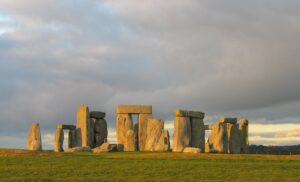
It has been interesting to watch two television programmes recently which both discussed an explicit link between archaeology and contemporary global social politics. The ‘Cheddar Man’ programme on Channel Four earlier in February was keen to flag up the way in which confirmation that the indigenous hunter-gatherer population of Europe (and the UK) was black might impact on modern notions of Britishness and belonging. The first episode of ‘Civilisations’ on BBC Two at the beginning of March, started with a reminder of the way in which the destruction of iconic art and monuments is still seen as a powerful tool by which to lessen a culture or nation.
In the event, neither programme went on to discuss the deeper ramifications of the material they highlighted, but there is no doubt that the footage left a powerful message. It is a message that would not have been included in many popular accounts of archaeology a few years ago.
Throughout my career as an archaeologist I have seen the discipline move from a historical teaching aid: ever ready to provide information about life in the past, to more of an analytical tool: something that helps us to understand our position in the world and the way in which we relate to others. It is very positive to see archaeology moving out from the narrow bounds of academia into full-on engagement with life in the twenty-first century, but it is also an engagement that comes with responsibilities and it needs to be handled with care. In general, I have, previously, been cautious about attempts to engage with political debate. It is very easy to misrepresent the conclusions of academics and there have been cases where apparently innocent archaeological material has been used (deliberately and accidentally), to bolster the darker side of humanity.
Nevertheless, these are aspects of life from which we cannot hide away. Indeed, if we, as archaeologists, engage full on and make sure that our voice is heard, then perhaps we can emphasise the role of archaeology as part of a more informed debate. The important thing is not to be afraid to continue to ensure that archaeological ‘reality’, as we know it (at any one time), is out there in the public eye. It is a new responsibility, but one that we should take on.
Of course, it will not always be easy, and it should induce a certain amount of self-reflection. To take the examples cited above: the use of physical appearance to identify otherness, and the desecration of sites and monuments have both been weaponised by many societies (including our own) as part of the human armoury for millennia. But, as they say, ‘two wrongs don’t make a right’, and just because something happened in the past does not mean that we would espouse it today. Hopefully, deeper consideration of matters such as these, and their role in the present world, will now lead to a more nuanced and tolerant society.
I cannot help experiencing a sense of irony here. One of the founders of modern archaeology, Gordon Childe, came into the discipline from a career in politics and he had no problems in using archaeology to further his own political beliefs. It is a thread which runs through his books. He saw archaeology as intrinsic to the understanding of modern society. We have, it seems, come full circle.
Meanwhile, it is good to see that those on television are not afraid to make their own beliefs and conclusions explicit. It adds an extra dimension to the archaeology and helps to enrich us all.
You must be logged in to post a comment.